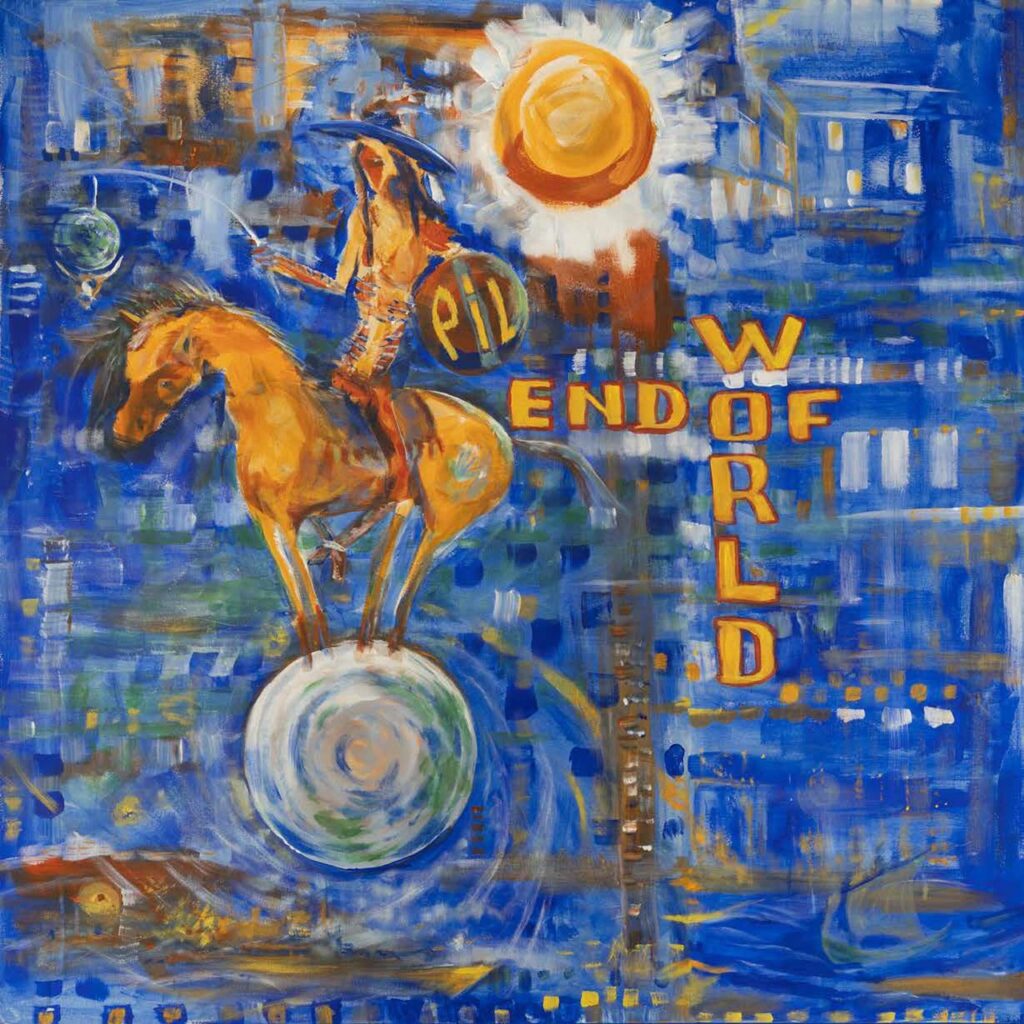John Lydon has made a career out of being contrarian, so it seems less surprising that some fans had written him off as a frustrated old reactionary tarnished by his pro-Trump and pro-Brexit views than that he should follow up with something as moving as this year’s “Hawaii,” a tender ode to his wife Nora Forster and her struggle with Alzheimer’s. Just as strikingly, Public Image Ltd, the group Lydon has fronted on and off since 1978, entered the song in Ireland’s national selections for Eurovision 2023, placing fourth behind simpering pop band Wild Youth—a further bizarre twist in the often frustrating, always captivating path of the former Sex Pistol.
“Hawaii,” released in January, was the first taste of End of World, PiL’s first album since 2015’s solid, if underwhelming, What the World Needs Now…. You might assume Lydon’s attention would have been elsewhere during the new album’s protracted recording process. It’s been in gestation since 2019, a time in which Forster’s condition worsened (she died in April 2023) and Lydon became embroiled in a court case against the other former Sex Pistols. Remarkably, this situation seems to have concentrated Lydon’s mind. “Hawaii” is one of his best songs in a long while, combining the desperate pain of PiL’s 1979 song “Death Disco”—inspired by watching his mother die of cancer—with a melodic, wistful edge that evokes life slipping away in a fog of morphine and sunshine.
Crucially, Lydon’s bandmates are also at their best on “Hawaii,” which serves as the album’s moving conclusion. The song was birthed from Lu Edmonds’ mournful Hawaiian guitar licks, while Bruce Smith’s drums roll like waves against the shore, making it the rare PiL song since their 2009 reunion where the music lives up to the vocals’ ingenuity and character. The same could be said for “End of the World,” which combines stentorian singing with a semi-disco beat, sauntering bassline, and a screeching guitar riff that hits like a splash of cold water to the face. The song is obtuse, lovely, and swaggering: the apocalypse on poppers, like classic early PiL. “The Do That,” seems to have borrowed from swing jazz, an unexpectedly jaunty turn from a band that sounds liberated from what people might expect from them. “Being Stupid Again” would have been better as an instrumental, with Lydon’s strawmannish and wearisome caricaturization of student politics—“All maths is racist,” etc.—distracting from a menacingly nebulous guitar effect that swirls and contracts like a toxic cloud.
A disappointing vocal is a rarity, though. In his nearly five decades as a singer, Lydon has rarely been less than compelling. His performances have balanced fury, drama, compassion, and pain, with the intensity and sheer belief dialed up to 10. And he is largely in snarling, triumphant form on End of World: The acrid intensity of his voice on “Penge,” delivered with the berserker fury of a raiding Viking, elevates the song above its rather mundane riff, while the multi-tracked payoff to “L F C F” (“Liars, Fakes, Cheats, and Frauds”) is a masterclass in theatrical shade, ripping through the speaker like an explosion of street preachers.
Lydon has always sung because he has to; his singular voice couples acute distress with an almost physical sense of relief. But he is at his best when he meets his match, be it in the thuggish intensity of Sex Pistols guitarist Steve Jones, the hypnotic low-end power of bassist Jah Wobble, or Keith Levene’s spidery anti-blues guitar. End of World is hellishly inconsistent, its mid section adrift in ’80s funk-rock sheen, like INXS being harassed by an angry wasp. But when it works, End of World, more than any other recent PiL album, offers the winning combination of instrumental oddity and vocal drama. Lydon could put his voice to almost anything, musically, and it would be worth a listen; but it’s far better when it’s like this.
All products featured on Pitchfork are independently selected by our editors. However, when you buy something through our retail links, we may earn an affiliate commission.

